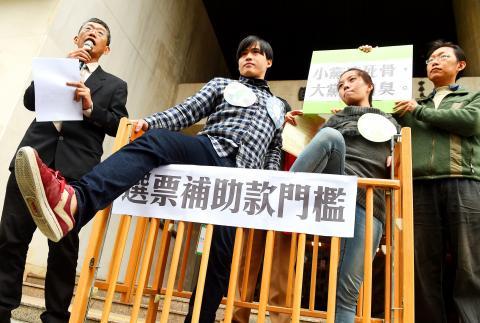A coalition of small political parties and social activist groups yesterday congregated in front of the Legislative Yuan to urge that the threshold for parties to receive Central Election Commission subsidies be lowered, to ensure a fairer distribution of resources among all parties.
Citing as an example the previous legislative election in 2012, Tree Party Chairman Pan Han-chiang (潘翰疆) said the government issues a subsidy of about NT$616 million (US$19.3 million) annually for legislators-at-large, of which major political parties, such as the Chinese Nationalist Party (KMT) and Democratic Progressive Party (DPP), are given a combined total of more than NT$520 million.
Under the existing system, political parties that receive more than 5 percent of the total votes get a NT$50 subsidy per vote; the subsidies are issued every year over the four-year legislator-at-large term.

Photo: Chien Jung-Fong, Taipei Times
Pan urged that Article 43 of the Civil Servants Election and Recall Act (公職人員選舉罷免法), which stipulates the 5 percent threshold, be amended to lower the threshold to at least 1 percent, and that a cap be imposed on the amount of subsidies a political party can receive.
If the threshold is lowered to 1 percent, it would only increase government expenditure for the subsidies by about NT$30 million, Pan said.
“If it can be lowered to 0.5 percent, the government will only need to spend an additional NT$40 million. It is really not too much to ask, but it will greatly benefit smaller political parties’ operations,” he said.
Tree Party co-chair Lin Chia-yu (林佳諭) highlighted the disparity in funding between large political parties and their smaller counterparts, saying that the campaign funds spent by all 16 candidates nominated by her party in the November elections amounted to less than half of what a KMT or DPP Taipei councilor candidate spent.
By lowering the subsidy threshold, visionary young people would have a better chance of being elected into the legislature to push for reform, she said.
Youth Occupy Politics cofounder Shan Yi-che (冼義哲) used Germany as an example, saying that it has since 1969 lowered the threshold for subsidies to political parties to 0.5 percent of the total party votes, which granted the Piratenpartei (Pirate Party) — a young political party formed in 2006 — enough resources to land 15 seats (9.7 percent of the total floor seats) in the Berlin City Council in 2011.
Yesterday’s rallying groups later set up a crib in front of the legislature building to represent the subsidy threshold and acted out skits to satirize the current system, which they said widens the wealth gap between political parties and produces an even more disproportionate ratio of legislative floor seats.

A Taiwanese software developer has created a generative artificial intelligence (AI) model to help people use AI without exposing sensitive data, project head Huang Chung-hsiao (黃崇校) said yesterday. Huang, a 55-year-old coder leading a US-based team, said that concerns over data privacy and security in popular generative AIs such as ChatGPT and DeepSeek motivated him to develop a personal AI assistant named “Mei.” One of the biggest security flaws with cloud-based algorithms is that users are required to hand over personal information to access the service, giving developers the opportunity to mine user data, he said. For this reason, many government agencies and

The National Fire Agency on Thursday said a series of drills simulating a magnitude 8.5 earthquake would be held in September to enhance the government’s emergency response capabilities. Since earthquakes cannot be predicted, only by continuously promoting disaster prevention measures could Taiwan enhance its resilience to earthquakes, agency Director-General Hsiao Huan-chang (蕭煥章) said in a news release. The exercises would be held to mark annual National Disaster Prevention Day on Sept. 21, the aim of which is to test Taiwan’s preparedness and improve its earthquake resilience in case of a major temblor, Hsiao said. As part of those drills, an earthquake alert would

DEFENSE: The National Security Bureau promised to expand communication and intelligence cooperation with global partners and enhance its strategic analytical skills China has not only increased military exercises and “gray zone” tactics against Taiwan this year, but also continues to recruit military personnel for espionage, the National Security Bureau (NSB) said yesterday in a report to the Legislative Yuan. The bureau submitted the report ahead of NSB Director-General Tsai Ming-yen’s (蔡明彥) appearance before the Foreign and National Defense Committee today. Last year, the Chinese People’s Liberation Army (PLA) conducted “Joint Sword-2024A and B” military exercises targeting Taiwan and carried out 40 combat readiness patrols, the bureau said. In addition, Chinese military aircraft entered Taiwan’s airspace 3,070 times last year, up about

STRICTER ENFORCEMENT: Taipei authorities warned against drunk cycling after a sharp rise in riding under the influence, urging greater public awareness of its illegality Taipei authorities have issued a public warning urging people not to ride bicycles after consuming alcohol, following a sharp rise in riding under the influence (DUI) cases involving bicycles. Five hundred and seven people were charged with DUI last year while riding YouBikes, personal bicycles, or other self-propelled two-wheelers — a fourfold increase from the previous year, data released by the Taipei Police Department’s Traffic Division showed. Of these, 33 cases were considered severe enough to be prosecuted under “offenses against public safety,” the data showed. Under the Road Traffic Management and Penalty Act (道路交通管理處罰條例), bicycles — including YouBikes and other